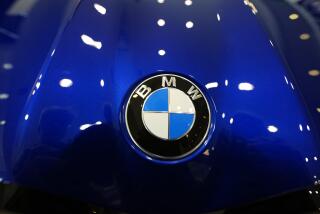Contamination Blamed on Bottling Problem
GREENWICH, Conn. — A bottling problem in France is believed to have caused the benzene contamination that led to a voluntary recall of all Perrier water in the United States and Canada, the manufacturer said Sunday.
Perrier has halted worldwide production of the naturally carbonated mineral water until the problem has been isolated and resolved, said Ronald V. Davis, president of the bottler’s U.S. arm, Perrier Group of America.
Davis said the company had narrowed the problem to its bottling process in France and expected to be able to pinpoint the source of the low-level contamination by the poisonous solvent “within a few days.”
“We think we have zeroed in on what the problem is, but do not want to do anything until we are 100% certain,” Davis said. “We’re moving as prudently and as cautiously as we can. We know it’s in the bottling process.”
Perrier, whose product has become something of a status symbol for the health-minded and well-to-do, voluntarily began recalling all bottled mineral water distributed to the United States on Friday after it was told by the U.S. Food and Drug Administration that traces of benzene were found in 13 samples of the mineral water.
The FDA said the 12 to 19 parts-per-billion levels of benzene detected posed no significant short-term health risks, but exceeded the standard maximum contamination of 5 ppb of benzene for public drinking water.
Benzene is a clear, flammable, poisonous liquid used as a solvent for fats and in making lacquers, varnishes and dyes. It also is believed to be a cancer-causing agent.
Davis said French health officials had confirmed that the contamination did not come from the underground mineral spring in Vergeze that produces the carbonated water.
Davis said the recall was extended to Canada late Saturday because Canada and the United States share the same distribution system. He said the company planned to destroy its entire inventory of about 72 million bottles for the United States and Canada.
The mineral water could be off the shelves in the two countries for two to three months, which could cost the company more than $40 million in sales, Davis said.
“In some places, we could be back (on the shelves) before that,” Davis said. “We’re trying to be as conservative as possible.”
Perrier has not detected benzene in any European samples and has no plans to recall the water from European stores, but has halted worldwide production as a further precaution, Davis said.
“We want to make sure the problem is 100% isolated,” Davis said.
Davis said he could not calculate what the total cost of the recall and production shutdown would be to the company, which has annual sales of about $150 million.
“We’re trying to deal with this in the most responsible and professional way possible,” Davis said. “(The cost) will be what it will be.”
Davis said he thought Perrier was being unfairly treated by the media, which he said were sensationalizing the story.
“The head of the FDA said if he had a bottle of Perrier in his refrigerator, he’d drink it, and that got buried in the stories,” Davis said of a remark by acting FDA Commissioner James Benson.
“People should know there is no more risk to this than drinking a glass of apple juice, which has more benzene in it, or a cup of coffee, which also has more benzene,” Davis said.
Rather than launching the voluntary recall, the company could have just issued a national health advisory, Davis said.
“We were within our legal rights to do that,” Davis said. “We could have just paraded out a bunch of FDA and other witnesses who said there was no risk, but we didn’t do that. We went a further step, a very expensive step, that shows the company is committed to integrity.”
Davis said the company “was trying to do the ethical thing. We believe we’re doing what is right and I think that is a winning strategy over time.”
More to Read
Inside the business of entertainment
The Wide Shot brings you news, analysis and insights on everything from streaming wars to production — and what it all means for the future.
You may occasionally receive promotional content from the Los Angeles Times.










